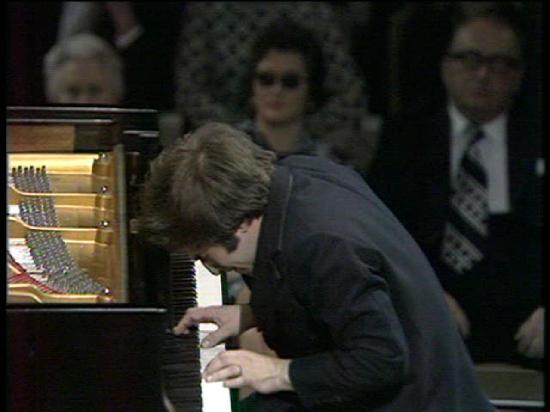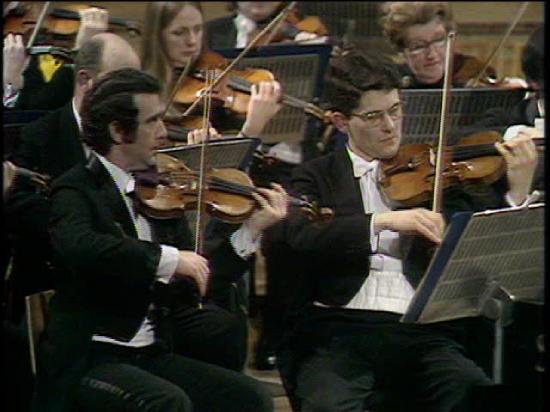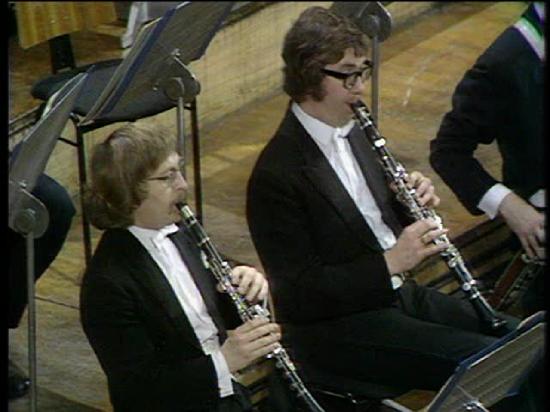Beethoven: The Piano Concertos
Introduction
These concerts, shown on the Beeb almost 35 years ago (and sadly enough, I remember at least one of them) are the sort of thing which just doesn't get commissioned any more for mainstream channels, outside of the Proms of course. The BBC though, once upon a time, made a point of trying to show the best live music outside the summer months - and even Channel 4 used to be rather good at showing a decent opera series occasionally - no longer though!
Now, contemporary 'classical' music broadcasting for the masses generally consists of abominations such as 'Il Divo', Hayley Westenra, my compatriate Kath, or some fat bloke who crucifies Puccini on primetime TV and is hailed as the new Pavarotti just because he made some second-rate actress force some tears out. This needs to change of course, but until then, there are DVDs such as this which show how things should be done, with not a phone-in to be seen.
Basil Moss (who made his name as a character actor in the 60s and 70s) conducts us through the proceedings with a charming, if slightly reverential manner, but obviously knows his stuff. I can't imagine modern-day presenters reading from a book to get quotes from those who worked with Beethoven, and still fitting in everything before the conductor and soloist take to the stage.
Vladimir Ashkenazy is caught here at his youthful(ish) peak at 36 years old. Twelve years previously he won the Tchaikovsky competition in Moscow, and in the same year as this concert, won the Grammy Award for his Beethoven cycle with Solti and the Chicago Symphony Orchestra.
Audio
It being mono, of 'Enhanced' mono (should you be inclined to chooose the option), I was actually very happy with the overall sound. It's certainly 'of an age', but with some careful tweaking of treble/bass and volume, you can get a very good balance, and in general, the orchestral woodwind solo sound is perfect (very important in these works).
There are some issues with the recording of the final concert, which may well have connections with the video quality in that I had to turn things up quite dramatically to hear the full effect, and there is also a 'pre-echo' of loud orchestral sections before they actually happen (of the type you hear from cassesttes from time to time).
Audience coughs are loud and clear, and someone has obviously planted a 'ringer' to let rip at the most delicate moments, but that just shows that, unlike the hairstyles, some things don't change.
Video
You cannot get away from that fact that this is a transfer from a 70s TV recording, but for the most part, it's coping very well. A fairly major issue with the video quality in the final programme spoils things - I got some video 'tracking' isues in several sections - and there is also an issue with sound (see above).
Extras
Officially, none, however you could probably count the 'O-level' essay within the booklet by Michael Steinberg, and indeed the Overtures and Symphony included in the programme.
Conclusion
This could probably be described as 'big-band Beethoven', but then there's really nothing wrong with that, in the right hands at least. Here, Haitink controls things with great charm and subtletly considering the size of the orchestra, and the LPO play brillianty in the most part, except for the final concert unfortunately. Here, there seems to be some uncertaintly about the second Leonore overture (violin bowing goes a bit haywire), and there's a blatant missing solo bassoon line in the 5th concerto which will, of course, be there (or not, as it were) every time you watch the first movement.
Apart from this glaring error, I have very little to compain about. The other non-piano works are fantastic, especially the 8th Symphony (one of the composer's favourites). The minuet may be a little slow for some tastes, but the stylish playing, and excitement in the fast movements is second to none.
I have a great fondness for the LPO, having watched them playing in the Swansea Festival at around this time, and it was great to see those players again, but tinged with a bit of sadness knowing that some are no longer around. Rodney Friend certainly is though, and he leads as only one of the best Concertmasters can (a shame a few of the players behind couldn't always follow him, but that's just me being picky).
Ashkenazy's playing in the concertos is unashamedly Romantic, yet the orchestra, with Haitink's careful direction, plays clearly and together enough to sound as if it's a much smaller band. The first two concertos are early-ish works, and even though the performances may lack some depth, are never less than great fun.
Some may find the piano sound a little harsh, due to Ashkenazy's insistence on making sure a crescendo is what it says it is, and all written sf's are never played-down, but then isn't this what Beethoven would have done himself? (more likely as his deafness increased).
There are moments of incredible beauty in the slow movements of 3 and 4 which can only be caught in a live concert (Ashkenazy's preparation for the first chord of the slow movement of No.3 should be watched by all aspiring soloists), and despite the reservations I have about Leonore 2 and the first movement of the 'Emperor', these recordings are an essential part of any serious classical music DVD collection.
The Grammy award may well have been given for a studio performance, and with a different conductor and orchestra, but the importance of live concerts such as these should never be underestimated.



Your Opinions and Comments
Be the first to post a comment!